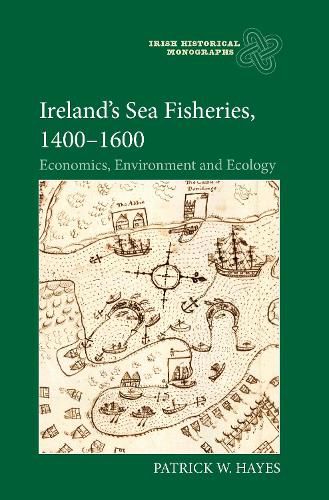Readings Newsletter
Become a Readings Member to make your shopping experience even easier.
Sign in or sign up for free!
You’re not far away from qualifying for FREE standard shipping within Australia
You’ve qualified for FREE standard shipping within Australia
The cart is loading…






This book examines the environmental, political, and economic history of Ireland's marine fisheries from 1400 to 1600. It combines a wide range of historical sources with innovative digital research methods to provide a comprehensive and systematic overview. Government letters and court documents highlight the diverse range of fishing fleets from across Europe that visited Irish waters in the early sixteenth century, bringing wealth and cultural influence to the native Irish, who developed complex systems to protect and tax the visitors. Furthermore, trade records illustrate that fish was Ireland's premier export in the late fifteenth and early sixteenth centuries. However, a range of factors led to the industry's collapse by the end of the sixteenth century: the Tudor conquest which disrupted fishing operations and fundamentally altered who controlled fishing resources; the destabilization of Irish waters resulting from the terrestrial conflict, which allowed pirates to thrive; an influx of cheap cod from the newly exploited fisheries in Newfoundland which changed consumption patterns in Ireland and across Europe; and shifting climatic conditions and decades of over-exploitation which meant fewer fish and poorer catches. Overall, the book reveals that fisheries form a vital part of the broader environmental, political, and economic history of Ireland.
$9.00 standard shipping within Australia
FREE standard shipping within Australia for orders over $100.00
Express & International shipping calculated at checkout
This book examines the environmental, political, and economic history of Ireland's marine fisheries from 1400 to 1600. It combines a wide range of historical sources with innovative digital research methods to provide a comprehensive and systematic overview. Government letters and court documents highlight the diverse range of fishing fleets from across Europe that visited Irish waters in the early sixteenth century, bringing wealth and cultural influence to the native Irish, who developed complex systems to protect and tax the visitors. Furthermore, trade records illustrate that fish was Ireland's premier export in the late fifteenth and early sixteenth centuries. However, a range of factors led to the industry's collapse by the end of the sixteenth century: the Tudor conquest which disrupted fishing operations and fundamentally altered who controlled fishing resources; the destabilization of Irish waters resulting from the terrestrial conflict, which allowed pirates to thrive; an influx of cheap cod from the newly exploited fisheries in Newfoundland which changed consumption patterns in Ireland and across Europe; and shifting climatic conditions and decades of over-exploitation which meant fewer fish and poorer catches. Overall, the book reveals that fisheries form a vital part of the broader environmental, political, and economic history of Ireland.